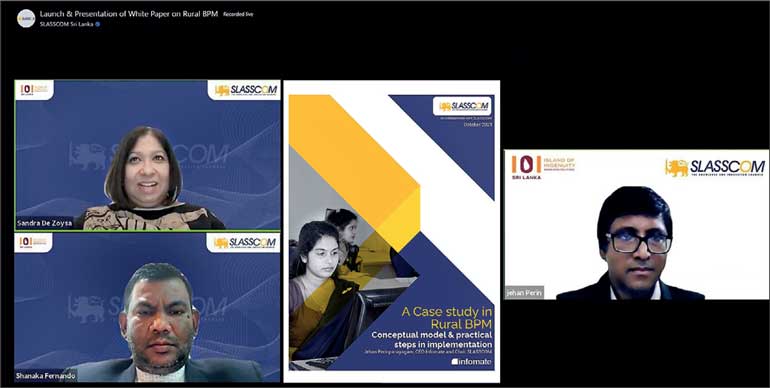Wednesday Feb 18, 2026
Wednesday Feb 18, 2026
Friday, 5 November 2021 00:00 - - {{hitsCtrl.values.hits}}

The launch of the first-ever white paper for the rural BPM industry
The Sri Lanka Association of Software Services Companies (SLASSCOM), as the nation’s chamber for IT/BPM development, has long been a proponent of the widespread adoption of tech and BPM across the nation.
Strengthening the rural BPM initiative further, SLASSCOM recently launched Sri Lanka’s first-ever rural BPM white paper that will pave the way for many more IT/BPM companies to adopt similar models successfully.
Addressing the gathering, SLASSCOM Chairperson Sandra De Zoysa stated: “Today, we have taken a great step forward towards making it possible to focus on the un-tapped workforce in rural Sri Lanka, giving them the opportunity for employment and encouraging them to be global citizens by providing a world-class working experience with globally renowned brands who are customers of our leading BPM organisations in our country. Achieving this aspiration is a pathway for achieving our vision for 2025; of $ 5 billion in export revenue, fostering 1,000 start-ups and providing employment to a workforce of 200,000.”
The event was attended by members of SLASSCOM, leading industry veterans and a host of local BPM companies. SLASSCOM Vice Chairman and Infomate Ltd. CEO Jehan Perinpanayagam presented the white paper along with a passionate and thought-provoking case study of what was known as Sri Lanka’s first e-village, in the agricultural village of Mahavilachchiya.
Outlining the journey taken at Mahavilachchiya that was transformed into an e-village he explained, “We were really impressed with the high levels of commitment and motivation shown by the selected staff at Mahavilachchiya and their high volumes of productivity. They had great attitude and a willingness to learn.”
Jehan discussed how volumes, earning’s and quality, together with morale, were monitored in order to ensure sustainability of the project and how regular communications helped establish the employees’ confidence in communicating. He stressed the importance of being mindful about cultural and behavioural sensitivities when developing and guiding talent in rural areas stating, “It was an important learning to note that we couldn’t apply the same corporate rules but had to respect and learn some of the sensitivities in that region.”
Jehan further discussed the expanding of BPM and BPO initiatives into regions such as Seenigama and Jaffna and how more developments will continue to expand the nation’s talent pool. Speaking on the expansion of rural BPM initiatives, Jehan alluded to the resulting social impact created for the citizens of each region, sharing that it leads to a degree of poverty alleviation through the provision of sustainable employment opportunities within an accessible locale, to individuals seeking employment. He also stated that development of similar initiatives would undoubtedly lead to the development of BPM on a national level.
Presenting findings and critical success factors of the Rural BPM initiative, Jehan pointed out key focus areas organisations need to be aware of, chief among them being the investment in development of technical, leadership and soft skills. He stated that challenges in written communications are to be expected and maintaining a CSR focus at the establishment stage and maintaining cultural sensitivity is critical. Regular visits and constant communication is greatly encouraged and remain a main activity an organisation needs to be involved in.
He further explained the nexus of private sector, Government authorities and charities that came together to build a sustainable model and elaborated on the roles played by ICTA, the John Keells Foundation, the Foundation for Advancing Rural Opportunities (FARO), as well as vital roles played by local foundations and some passionate, committed individuals.
The enduring message from the event was in order for Sri Lanka to develop and move forward, it is not enough to be limited to the talent pool of the major cities, but in organisations spreading their reach and making use of the rich talent Sri Lanka has to offer in all regions, to help propel Sri Lanka to be a leading hub in the global arena for top BPM talent.